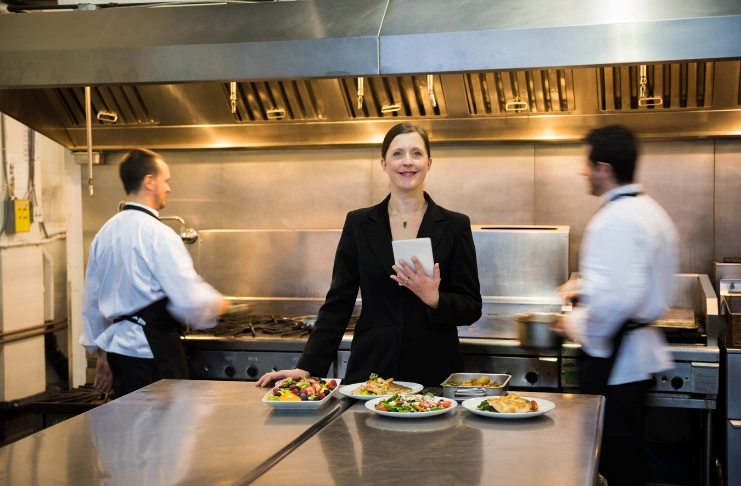According to the Bureau of Labor Statistics, an average of 44,500 restaurant manager openings are projected yearly. This demand stems from the industry’s need for leaders who balance multiple priorities while maintaining composure under pressure.
In fact, the difference between a struggling restaurant and a thriving one often boils down to the caliber of management. Today’s food service industry requires managers with diverse skill sets, including soft skills, beyond the traditional understanding of food service. From financial acumen to emotional intelligence, the modern restaurant manager must be versatile, adaptable, and forward-thinking.
This article explores the top eleven restaurant manager skills that distinguish exceptional leaders from merely adequate ones. If you plan to apply for a restaurant manager position, adding these skills to your CV will definitely charm things up.
Skill 1: Leadership

The foundation of any successful restaurant operation begins with strong leadership at the helm. A restaurant manager who leads effectively creates an environment where both staff and customers thrive, establishing a culture of excellence that permeates every aspect of the business.
Clear Vision and Direction
Successful restaurant managers have a clear action plan. They articulate precisely what they expect from their team, establishing standards that leave no room for ambiguity. They communicate the restaurant’s values, mission, and objectives in ways that inspire staff to align their efforts with organizational goals.
Leading by Example
A good restaurant manager demonstrates the work ethic and attention to detail they expect from others. By rolling up their sleeves during busy periods and maintaining composure under pressure, they earn respect and set the standard for performance.
Empowering Teams
Micromanagement stifles creativity and breeds discontent. Skilled managers in the hospitality industry delegate appropriately, trusting staff with responsibilities that allow them to grow. They create an environment where employees feel confident in making decisions within clearly defined parameters.
Adaptability in Leadership Style
When managing restaurant staff, it’s evident that one size doesn’t fit all. The best restaurant managers adjust their leadership approach based on individual team members’ personalities, experience levels, and strengths. This flexibility fosters a more responsive and cohesive team.
Skill 2: Operational Excellence

Behind every smooth-running restaurant is a manager who has mastered the art and science of operations. This skill set ensures that daily processes flow seamlessly, allowing the establishment to deliver consistent quality even during the most challenging circumstances.
Systems Development and Implementation
Restaurant operations thrive on systems. Exceptional managers develop comprehensive procedures for everything a staff member would need. These systems ensure consistency and streamline operations, even when the manager isn’t physically present.
Time Management
In an industry where every minute matters, efficient time management is critical. A restaurant manager’s job is to prioritize tasks effectively, delegate appropriately, and focus on high-impact activities that drive business success, particularly during peak hours.
Crisis Management
Unexpected challenges, such as equipment failures or staff no-shows, are inevitable in hospitality management. The ability to assess situations quickly, identify solutions, and implement contingency plans distinguishes top-performing managers from their peers.
Quality Control
Maintaining consistent standards across all aspects of the restaurant experience requires vigilance. Successful managers develop systems for monitoring food quality, service standards, cleanliness, and ambiance, ensuring every guest receives the same exceptional experience.
Skill 3: Financial Acumen

Restaurant management is as much about financial control as it is about hospitality. Managers who understand the financial dynamics of their operation can make informed decisions that ensure long-term sustainability while delivering value to both owners and guests.
Budget Management
Understanding and controlling costs is fundamental to restaurant profitability. Skilled managers precisely track food, beverage, labor, and operational expenses, making data-driven decisions to optimize spending while maintaining quality.
Inventory Control
Inventory represents one of the largest investments in a restaurant business. Effective managers implement systems to monitor stock levels, minimize waste, prevent theft, and ensure optimal ordering patterns that balance fresh ingredients with cost efficiency.
Profit Maximization Strategies
Beyond cost control, successful restaurant managers identify opportunities to increase revenue through strategic menu engineering, thoughtful pricing, and sales training for staff. A study found that strategic menu engineering can help restaurants increase sales by up to 30%.
Financial Analysis
The ability to interpret financial statements, calculate key metrics, and understand cash flow patterns enables restaurant managers to make informed decisions about staffing, purchasing, and overall business strategy. This analytical approach to restaurant management separates thriving establishments from struggling ones.
Skill 4: People Management

At its core, the restaurant business is a people business. Great managers recognize that their most valuable asset is their team, and they invest significant energy in building, developing, and maintaining a staff that can consistently deliver exceptional experiences.
Recruitment and Hiring
Building a stellar team begins with identifying the right talent. Exceptional restaurant managers develop effective screening processes, ask insightful interview questions, and select candidates who align with skill requirements and cultural fit.
Training and Development
Investment in staff training yields returns through improved service, reduced errors, and increased retention. Forward-thinking managers create comprehensive onboarding programs and provide ongoing development opportunities to keep staff engaged and current.
Performance Management
Regular feedback and clear expectations drive continuous improvement. Successful managers establish performance metrics, conduct formal reviews, and provide constructive guidance that helps staff evolve professionally while strengthening restaurant operations.
Conflict Resolution
Employee conflicts can poison workplace culture if left unaddressed. Skilled restaurant managers tackle issues promptly and fairly, serving as impartial mediators who find equitable solutions while preserving team dynamics.
Skill 5: Communication

Effective communication is the critical infrastructure connecting all aspects of restaurant operations, particularly managing staff. Without clear, consistent, and thoughtful communication channels, even the most well-conceived strategies and systems will falter under real-world conditions.
Clear and Consistent Messaging
Ambiguity can cause costly mistakes, especially in fast-paced industries like restaurants. Top restaurant managers communicate expectations, changes, and feedback precisely and clearly, ensuring all team members understand priorities and procedures.
Active Listening
Understanding staff concerns, customer feedback, and market signals requires attentive listening. Effective managers cultivate this skill, creating space for others to express thoughts and demonstrating genuine interest in different perspectives.
Cross-Departmental Communication
Kitchens, service staff, and administrative staff must function as a unified team. Successful restaurant managers facilitate seamless information flow between departments, preventing the silos that lead to service breakdowns and internal conflicts.
External Communication
Relationships with vendors, community partners, and regulatory agencies significantly impact restaurant operations. Skilled managers nurture these connections through professional, transparent communication that builds mutually beneficial partnerships.
Skill 6: Customer Service Excellence

In an industry where the customer experience defines success, exceptional managers instill a culture that puts guests at the center of every decision and action. This mindset transforms transactional interactions into memorable experiences that build loyalty and drive repeat business.
Anticipating Needs
Exceptional service anticipates guest desires before they’re expressed. Top restaurant managers train staff to read subtle cues and empower them to take proactive measures that enhance the dining experience.
Problem Resolution
How complaints are handled often determines whether customers return. Effective managers establish clear protocols for service recovery, teaching staff to address issues promptly while giving them appropriate authority to make things right.
Consistency and Standards
Customers value predictability in their dining experiences. Successful restaurant management ensures consistent service quality across all shifts and staff configurations through standardized training and clear expectations.
Personalization and Recognition
Regular guests appreciate being remembered. Skilled managers implement systems for tracking preferences and recognizing loyal customers, creating the personalized touches that transform occasional diners into devoted patrons.
Skill 7: Culinary Knowledge

Although managers don’t necessarily need to be master chefs, a solid understanding of culinary principles and kitchen operations is essential for effectively overseeing the entire restaurant ecosystem and meaningful collaboration with the culinary team.
Menu Development
While head chefs typically lead menu creation, restaurant managers with culinary knowledge can contribute valuable insights regarding ingredient costs, preparation complexity, and market trends that influence menu design.
Food Safety Compliance
Protecting public health through rigorous food safety practices is non-negotiable. Food service managers understand HACCP principles, allergen management, and regulatory requirements, implementing systems that ensure consistent compliance.
Kitchen Operations
A deep understanding of kitchen workflow enables managers to make informed decisions about staffing, equipment purchases, and operational changes that impact food quality and service timing.
Food Cost Management
Controlling food costs while maintaining quality requires specific knowledge. Successful restaurant managers work closely with kitchen staff to optimize portioning, reduce waste, and make strategic purchasing decisions.
Skill 8: Business Acumen

Successful restaurant managers think like business owners, understanding market dynamics and competitive positioning while developing strategies that create sustainable advantages in a crowded marketplace.
Strategic Planning
Effective restaurant management requires looking beyond daily operations. Forward-thinking managers develop business plans with specific growth targets, market positioning strategies, and competitive analyses that guide long-term decision-making.
Marketing and Promotion
Understanding how to attract and retain customers is essential in the competitive restaurant industry. Effective managers develop marketing strategies highlighting their establishment’s unique value proposition and building community connections.
Competitive Analysis
Knowledge of competing restaurants informs strategic decisions. Skilled managers regularly assess market offerings, pricing structures, and service models, identifying opportunities for differentiation and improvement.
Innovation and Adaptation
The restaurant business demands constant evolution. Successful managers stay attuned to industry trends, emerging technologies, and shifting consumer preferences, implementing thoughtful changes that keep their establishments relevant.
Skill 9: Stress Management

The restaurant industry is notoriously high-pressure and demanding. Managers who excel in this environment have developed effective strategies for handling stress while creating a workplace culture that addresses the well-being of all team members.
Personal Resilience
Restaurant management involves long hours and high pressure. Effective managers develop strategies for maintaining physical and mental well-being despite these challenges and model healthy coping mechanisms for their teams.
Team Morale
A positive workplace culture improves both staff retention and guest experience. Skilled restaurant managers cultivate environments where team spirit thrives, implementing recognition programs and fostering camaraderie that sustains motivation during challenging periods.
Work-Life Integration
The demanding nature of restaurant operations makes a traditional work-life balance difficult. Successful managers help staff establish sustainable routines and provide scheduling flexibility whenever possible, recognizing that well-rested employees deliver superior performance.
Burnout Prevention
Preventing burnout requires proactive intervention. Great restaurant managers recognize early warning signs in themselves and their teams and implement preventive measures that preserve long-term performance and job satisfaction.
Skill 10: Technology Integration

In today’s digital-first world, technology has become essential to restaurant operations. Forward-thinking managers embrace technological solutions that enhance efficiency, improve the guest experience, and provide valuable data for decision-making.
POS System Optimization
Modern point-of-sale systems offer powerful analytical capabilities. Skilled restaurant managers leverage these tools to track sales patterns, inventory usage, and staff performance, extracting actionable insights that drive business improvements.
INDUSTRY INSIGHT
| The restaurant industry has undergone a significant transformation in recent years, accelerated by technological advancements and shifting consumer preferences. According to the National Restaurant Association’s 2024 Restaurant Technology Landscape report, 76% of operators consider technology a competitive advantage in today’s market. Modern restaurant managers are increasingly expected to navigate digital platforms, from reservation systems to delivery apps. Those who embrace technology to enhance operational efficiency and guest experience gain a significant edge in market competitiveness. Moreover, today’s restaurant customers expect personalized experiences and transparent practices. Managers who understand these evolving expectations and train staff accordingly position their establishments for greater customer loyalty and positive word-of-mouth. |
Reservation and Seating Management
Digital reservation platforms streamline guest management. Successful managers implement these systems effectively, optimizing table turns while maintaining a hospitable atmosphere that enhances the customer experience.
Inventory Technology
Digital inventory management reduces manual counting errors and improves ordering accuracy. Forward-thinking restaurant managers embrace these technologies, significantly saving time and reducing costs.
Digital Marketing
Online presence dramatically impacts restaurant visibility. Effective managers develop strategic approaches to social media, review platforms, and digital advertising that amplify their establishment’s unique appeal.
Skill 11: Sustainability and Environmental Stewardship

In an era where ecological concerns and sustainable practices are increasingly important to consumers, forward-thinking restaurant managers recognize that environmental responsibility is both an ethical imperative and a business opportunity.
Leading with a sustainability mindset reduces environmental impact, appeals to eco-conscious diners, and can significantly reduce operational costs.
Waste Reduction Strategies
Successful restaurant managers implement comprehensive programs to minimize food waste, from careful ordering and inventory management to creative menu planning that fully utilizes ingredients. They track waste metrics rigorously and continuously improve processes to reduce environmental impact.
Energy and Water Conservation
Environmentally conscious restaurant managers invest in energy-efficient equipment, implement water-saving technologies, and develop staff protocols that minimize resource usage without compromising guest experience or food quality.
Sustainable Sourcing
Leading restaurant managers build relationships with local producers and suppliers who follow sustainable practices. They understand the environmental and quality benefits of seasonal, locally sourced ingredients and effectively communicate these values to staff and customers.
Green Certification and Marketing
Knowledgeable managers pursue relevant environmental certifications and effectively incorporate sustainability messaging into their marketing strategy, connecting with like-minded consumers who prioritize ecological responsibility in their dining choices.
Conclusion
Becoming an exceptional restaurant manager requires continuous development across multiple skill domains. From leadership and operational excellence to financial acumen and technological aptitude, today’s successful restaurant managers combine diverse competencies that enable them to navigate industry complexities confidently.
The most effective restaurant leaders recognize that their development never truly ends. They remain curious, adaptable, and committed to refining their approach as industry standards and consumer expectations evolve.
Frequently Asked Questions
1. What are the skills needed to be a restaurant manager?
Restaurant managers need diverse skills, including leadership abilities, financial management knowledge, interpersonal communication skills, operational expertise, problem-solving capabilities, time management proficiency, and customer service excellence. Technical skills in inventory management, food safety, and technology systems are also essential for successful restaurant management.
2. What are the 3 basic skills required of a manager?
The three foundational skills required of any restaurant manager are:
1) People management skills to lead, motivate, and develop staff.
2) Financial acumen to understand and manage budgets, costs, and profitability.
3) Operational knowledge to ensure smooth daily functioning and consistent quality control.
3. What are your strengths as a restaurant manager?
Strong restaurant managers typically highlight strengths such as effective team leadership, efficient operations management, financial control capabilities, crisis management skills, customer service orientation, and composure under pressure. The specific strengths may vary based on individual experience and restaurant type.
4. What skills should a restaurant manager put on a CV?
A restaurant manager’s CV should emphasize leadership experience, financial management abilities, staff training and development skills, inventory control expertise, customer service excellence, problem-solving capabilities, knowledge of food safety regulations, technology proficiency (POS systems, scheduling software), and relevant industry certifications.
5. What are the qualities of a restaurant manager?
Essential qualities of successful restaurant managers include reliability, adaptability, attention to detail, integrity, emotional intelligence, resilience under pressure, decisiveness, positive attitude, accountability, and a genuine passion for hospitality and service excellence.
6. What makes the best restaurant manager?
The best restaurant managers combine technical expertise with exceptional people skills. They understand every aspect of restaurant operations while possessing the leadership abilities to inspire teams, the business acumen to drive profitability, and the customer service orientation to create memorable dining experiences. Their decision-making balances short-term needs with long-term vision.
7. What skills should a restaurant manager have?
Restaurant managers should possess leadership abilities, financial management skills, operational expertise, strong communication capabilities, problem-solving aptitude, time management proficiency, technological competence, customer service excellence, industry knowledge, and the ability to maintain composure under pressure.
8. What skills do you need to be a food manager?
Food managers need expertise in food safety and sanitation, inventory management, cost control, nutrition knowledge, menu planning, quality assurance, supplier management, regulatory compliance, recipe standardization, production planning, and general management skills.
9. What are the skills needed for a restaurant owner?
Restaurant owners need entrepreneurial vision, business planning abilities, financial management expertise, market analysis skills, strategic thinking, risk assessment capabilities, leadership qualities, networking abilities, marketing knowledge, legal/regulatory understanding, and operational restaurant knowledge.
10. What is your greatest strength as a restaurant manager?
While this varies by individual, many successful restaurant managers identify their greatest strength as their ability to develop and motivate teams, their skill in maintaining operational excellence under pressure, or their capacity to balance quality guest experiences with financial profitability goals.
11. What not to do as a restaurant manager?
Restaurant managers should avoid micromanaging staff, ignoring customer feedback, neglecting financial controls, failing to address employee conflicts, becoming complacent about food safety, resisting industry changes, showing favoritism among staff, making decisions without data, ignoring work-life balance, and losing sight of the guest experience.





